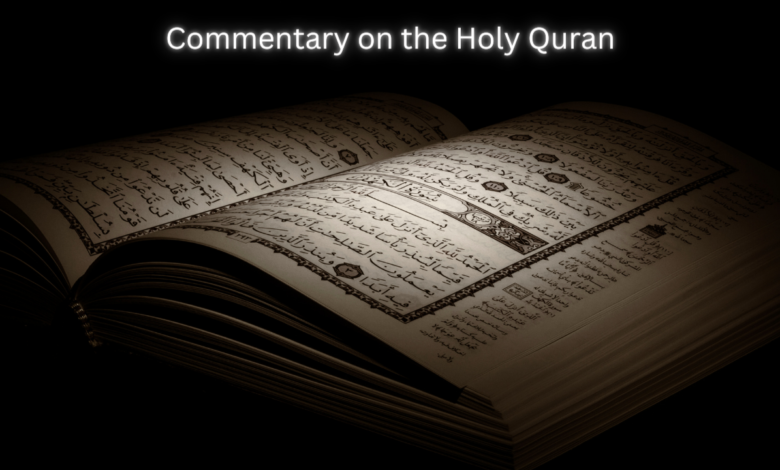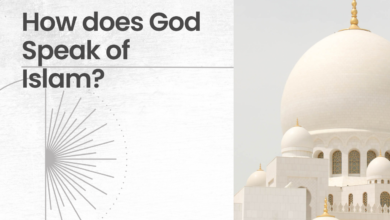Commentary on the Holy Quran
"Unlocking the Divine Wisdom: Commentary on the Holy Quran"

Commentary on the Holy Quran
A commentary on the Holy Quran, often referred to as “Tafsir,” is an exegesis or interpretation of the Quranic verses. It provides explanations, context, and insights into the meanings of the Quranic text.

Introduction
The Holy Quran, often referred to simply as the Quran, is the central religious text of Islam. It is considered by Muslims to be the literal word of God as revealed to the Prophet Muhammad through the Angel Gabriel over a period of 23 years. The Quran is revered not only for its religious significance but also for its literary excellence and profound wisdom. To gain a deeper understanding of its teachings, Muslims and scholars turn to commentaries on the Quran, known as Tafsir. In this article, we will explore the importance of Quranic commentary and its role in elucidating the meanings and messages of this sacred text.
The Quran: A Divine Revelation
Before delving into the world of Quranic commentary, it is crucial to appreciate the Quran’s significance in the lives of Muslims. It is the ultimate source of guidance for millions of people worldwide, addressing various aspects of life, including ethics, morality, law, spirituality, and more. Muslims believe that the Quran is the final and most complete revelation from God, building upon the messages of previous prophets and scriptures, such as the Torah and the Bible.
The Quranic Text: Complexity and Depth
The Quran is written in Arabic and is known for its eloquence, depth, and linguistic precision. Its verses are not organized chronologically but rather thematically, making it a unique literary work. The text employs various literary devices, such as metaphors, allegories, and parables, to convey its messages. While the Quran is accessible to readers in its original language, its depth often requires interpretation to grasp its full meaning.
The Role of Quranic Commentary
Quranic commentary, or Tafsir, plays a vital role in helping individuals understand the Quran’s teachings and their relevance to contemporary life. These commentaries are scholarly interpretations and explanations of the Quranic text, providing historical context, linguistic analysis, and insights into the verses. They serve several essential functions:
- Historical Context: Tafsir helps readers understand the historical circumstances in which specific Quranic verses were revealed. This context is crucial for comprehending the intended message and its relevance to the Prophet Muhammad’s time.
- Linguistic Analysis: Arabic is a rich language with nuances and subtleties that may not be apparent to non-native speakers. Tafsir offers linguistic analysis to reveal the precise meanings of words and phrases, ensuring a more accurate understanding.
- Legal and Ethical Guidance: Many verses in the Quran address legal and ethical matters. Tafsir provides interpretations and explanations that help Muslims apply these teachings to their daily lives and societal contexts.
- Spiritual and Moral Insights: The Quran contains numerous spiritual and moral lessons. Tafsir guides individuals in reflecting on these lessons and applying them to their personal growth and character development.
- Interpreting Complex Passages: Some Quranic verses are metaphorical or allegorical and require interpretation to uncover their intended meanings. Tafsir helps shed light on these complex passages.
Also Check
- When is 12 Rabiul Awal?
- Why is Jerusalem Important to Islam?
- What is a Prophet?
- What is Nikkah in Islam?
- Is Oreo Halal?
Prominent Commentators
Throughout Islamic history, numerous scholars have dedicated their lives to the study of the Quran and have produced extensive commentaries. Some of the most renowned Quranic commentators include Ibn Kathir, Al-Qurtubi, Al-Razi, and Ibn Arabi, among others. Each commentator brings their unique perspective and insights to the text, contributing to the rich tapestry of Quranic interpretation.
Contemporary Relevance
In today’s interconnected world, Quranic commentary continues to be of immense importance. It helps bridge the gap between the Quran’s timeless wisdom and the evolving challenges of modern life. Scholars and Islamic educators are continuously producing contemporary Tafsir to address contemporary issues, making the Quran’s guidance accessible to people from all walks of life.
Conclusion
The Quran, as the central religious text of Islam, holds a position of paramount importance for Muslims worldwide. Quranic commentary, or Tafsir, serves as a vital tool for understanding the Quran’s teachings, providing historical context, linguistic analysis, and guidance for practical application. As the world evolves, Quranic commentary remains relevant, helping individuals navigate the complexities of life while drawing wisdom from this divine text. It continues to be a source of inspiration, guidance, and moral enlightenment for millions of people around the globe.

FAQs About Commentary on the Holy Quran
What is a commentary on the Holy Quran?
A commentary on the Holy Quran, often referred to as “Tafsir,” is an exegesis or interpretation of the Quranic verses. It provides explanations, context, and insights into the meanings of the Quranic text.
Why is a commentary on the Quran necessary?
Commentaries on the Quran are essential for a deeper understanding of its verses. They help clarify complex or ambiguous passages, provide historical context, and offer insights into the Quran’s spiritual and moral guidance.
Who writes commentaries on the Quran?
Commentaries on the Quran are typically written by scholars of Islam who have extensive knowledge of the Arabic language, Islamic jurisprudence, history, and theology. These scholars are often referred to as “Mufassirun.”
How do scholars approach the interpretation of the Quran in their commentaries?
Scholars approach Quranic interpretation by considering various factors, including linguistic analysis, historical context, the Prophet Muhammad’s sayings (Hadith), and the consensus of Islamic scholars (Ijma). They aim to provide a comprehensive and accurate understanding of the text.
Are there different types of Quranic commentaries?
Yes, there are various types of Quranic commentaries, including linguistic (Tafsir al-Lughawi), legal (Tafsir al-Fiqhi), spiritual (Tafsir al-Tasawwuf), and thematic (Tafsir al-Mawdu’i). These commentaries focus on different aspects of the Quranic text.
Can anyone write a commentary on the Quran?
Technically, anyone can write a commentary on the Quran, but it requires a deep understanding of Islamic theology, language, and jurisprudence. Authenticity and credibility are crucial in this field, so scholars are typically the ones recognized for their interpretations.
Are there famous commentaries on the Quran?
Yes, there are many famous commentaries on the Quran, including Ibn Kathir’s “Tafsir al-Qurtubi,” Al-Jalalayn’s “Tafsir al-Jalalayn,” and Ibn Taymiyyah’s “Tafsir al-Tafsir al-Ibn Taymiyyah.” These are widely studied and respected.
Do all commentaries on the Quran agree on interpretations?
No, different scholars may have varying interpretations of certain Quranic verses. However, there is a consensus on many aspects of Quranic interpretation, and scholars often refer to these consensuses to maintain consistency.
Can commentaries on the Quran be translated into other languages?
Yes, many commentaries on the Quran have been translated into various languages to make the Quranic interpretation more accessible to non-Arabic speakers. These translations are valuable resources for those seeking to understand the Quran.
How can I choose a reliable commentary on the Quran for study?
To choose a reliable commentary, consider the reputation of the scholar who wrote it, the methodology they used, and whether it aligns with your specific area of interest (linguistic, legal, spiritual, etc.). Consulting with knowledgeable individuals or scholars can also help you make an informed choice.




